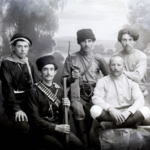 Svenja Bethke (Univ. of Leicester) and Eliza McKee (New York Univ.) (Web)
Svenja Bethke (Univ. of Leicester) and Eliza McKee (New York Univ.) (Web)
Time: 29.-30.11.2024
Venue: Leicester – and virtual space
Proposals by: 21.06.2024
This online workshop will explore the history of migration through the lens of dress in a global dimension. At the functional and intimate level, dress allows for the protection of the body from changing climate conditions as well as from the gaze of others. At the societal level, dress allows one to express feelings of belonging and identities. What is deemed ‘fashionable’ or ‘suitable’ to wear, depends on the geographical, social, political and cultural context and is subject to change. During and following migration, significant changes occur. Migrants are confronted with previously unknown climate conditions that require them to dress differently from what they are used to. With dress habits and norms differing between the countries of origin and the new ‘homeland’, dynamics of inclusion and exclusion are often expressed, felt and perceived in the sphere of dress and appearance.
Throughout history and up to contemporary times, people have migrated for a variety of reasons, to seek economic stability, educational and professional opportunities, to accompany their spouses and families, or to flee natural disasters, discrimination, persecution and violent conflicts. Experiences are as diverse as the migrants’ backgrounds and motivations but always marked by hierarchies between the Global North and the Global South, rural and urban spaces, and according to social class, gender, and definitions of race and ethnicity. The migrants’ experiences upon their arrival marked by dynamics of inclusion, exclusion, integration and adaptation are equally diverse and differ along the criteria mentioned.
With this workshop, the organizers aim to explore these themes and dynamics through the lens of dress in historical and global perspective. They invite proposals for paper presentations with a broad geographical and chronological focus on the following themes (but not limited to these):
– Skills and knowledge: How have migrants’ skills and knowledge in the making of dress influenced the design and production of dress?
– Networks and communities: What role have local, transnational and global migrant networks played in the making, distribution and consumption of dress; to what extent have separate and/or integrated infrastructures emerged?
– Experiences: What role have dress and outward appearance played in migrants’ experiences of inclusion and exclusion? How has dress been used to express changing feelings of belonging, social mobility, integration or demarcation?
– (Forced) migration, scarcity and the re-use of dress: which role has the re-use of dress played in the context of migration, for example with regards to clothing aid and/or second-hand clothing?
– Fashion, style and taste: How and which spaces and contexts have migrants influenced, questioned and redefined fashion ideals, style and taste?
– Sources on migrant dress, heritage and memory: How can we make use of material, visual and oral history sources to explore the connection of dress, heritage and memory in the migrants’ experience?
To allow for broad and global participation, this workshop will take place via an online video communication platform on 29 and 30 November 2024. The workshop will be live streamed and attendance by the public will be possible. Subject to additional funding, it may be possible for some participants to attend the workshop in person in Leicester, UK.
The organizers plan to publish a selection of the papers as part of an edited volume/special issue and therefore only welcome previously unpublished papers. Please send your paper proposals of no more than 300 words and a short bio of no more than 150 words by 21 June 2024 to: globalmigrantdress@gmail.com Applicants will be informed about their participation by mid-July 2024.
This workshop is a collaboration between Dr Svenja Bethke (Univ. of Leicester) and Dr Eliza McKee (New York Univ.) as part of Svenja Bethke’s AHRC Research, „Development and Engagement Fellowship on ‘Jewish Dress, Migration and Belonging’“, that she is holding between 2023-2025, Project Reference AH/X002950/1.
Kontakt: globalmigrantdress@gmail.com
Source: HSozuKult
